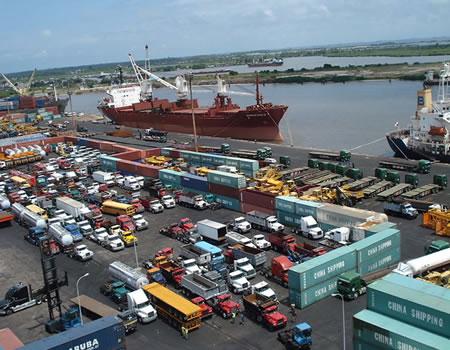
The Seaport Terminal Operators Association of Nigeria (STOAN) has listed four reasons: lack of harmonised vessel inspection by government agencies, cost of insurance, deplorable access roads and security, why Nigerian ports remain very expensive to call at.
According to STOAN spokesman, Bolaji Akinola, “If government is serious about implementing Ease of Doing Business policy, then it needs to start looking at what ships go through when they call at our ports.
“Talking about what ships go through, we are not talking of the landside or the clearing and forwarding aspect of shipping. We are talking of what happens at the quay side because they constitute the major reasons our ports remain one of, if not the most expensive ports to call at.
“During cargo delivery, the quay side is very significant; and this area is sparsely looked into. If government is serious about reducing cost of business, then it really needs to look at the cost of shipment because that constitutes about one-third of the entire cargo logistic chain.
“Costs on the land side, which is clearing cargoes and cargo delivery are just minute compared to costs at the quay side and the shipping side.
“If vessels are coming to Nigerian ports, and they suffer delay, it will add up to the cost of everything at the end of the day. The vessels will surely spread the cost of having to wait for additional days on the shippers.
“The activities of government agencies constitute a major delay for ships calling at Nigerian ports. Just like we have on the land side where we have a preponderance of government agencies, the same thing is happening on the quay side.
“When these vessels arrive our ports, a set of government agencies are mandated to board the vessel to do inspection jobs. However, a lot of these agencies don’t operate in unity, so these vessels spend so much time waiting to discharge their contents or depart our ports because all these agencies of government must issue their clearance. So, at the end of the day, the vessels are kept waiting for agencies of government to come onboard and do their jobs.
“These agencies of government don’t work in unity, so they take their turns to board the vessel, and that takes time, which in shipping, means money. Immigration officials will come, do their work on the ship and go, and then Customs too will come and do theirs maybe after an hour that the Immigration officials had left. After another 45 minutes, Quarantine will want to come, and there is still Port Health, NIMASA and so many more.
“At the end of the day, the vessel spends so much time getting inspected by different government officials, and spreads the cost of having to wait that long on the shipments that she is carrying. The shippers pay the huge bill that such delay caused and the common man on the street eventually is at the receiving end of the whole value chain. So, you see a major reason why Nigerian ports remain very expensive?
“For the other two reasons, security and deplorable access roads, we commend government for its intervention. The marine police are doing a great work on attacks on vessels at anchorage while the roads are being reconstructed.
“But government needs to look at activities of different government agencies on vessels during inspection. There activities need to be harmonized. The inspection should be done jointly so that it can be once.
“Without a harmonised inspection, vessels spend so much time waiting to get clearance from government agencies before dischargin and departing, and this add up to what makes our ports very expensive.”
Source: TribuneWhy cost of
